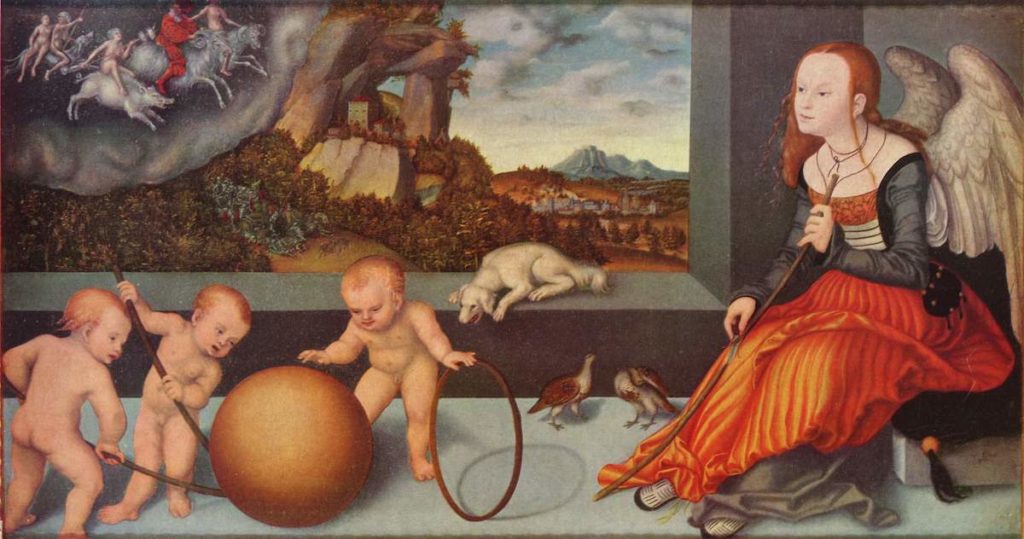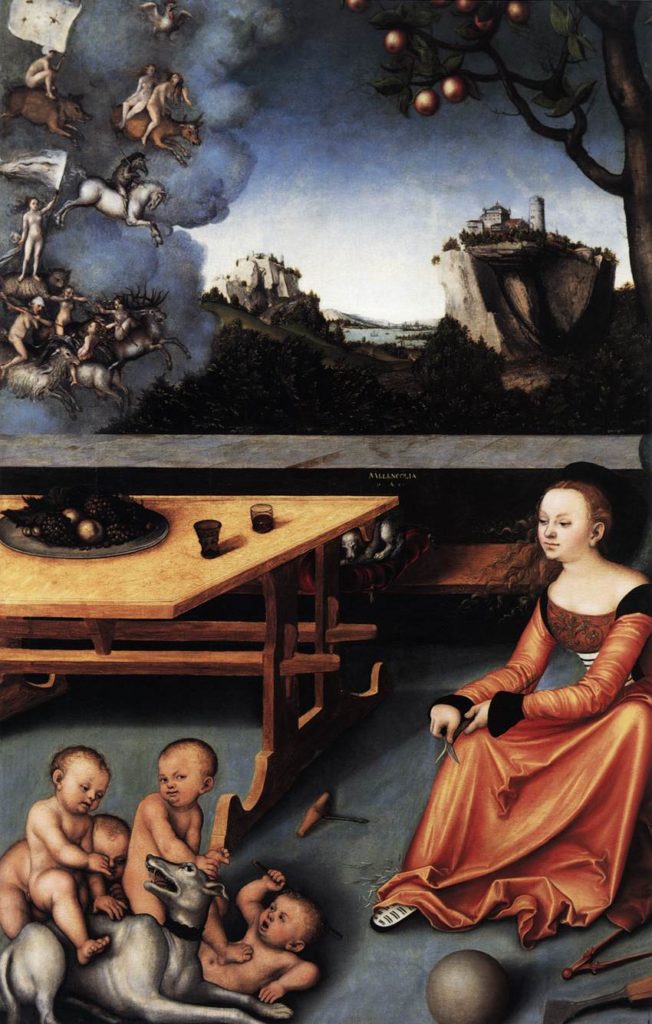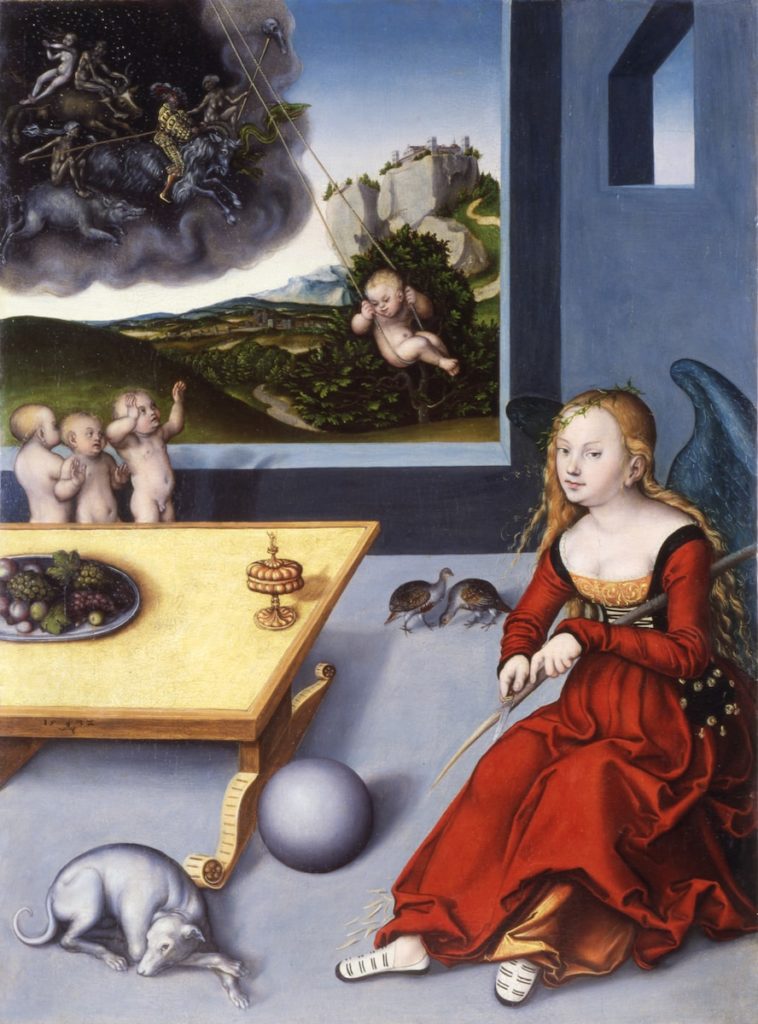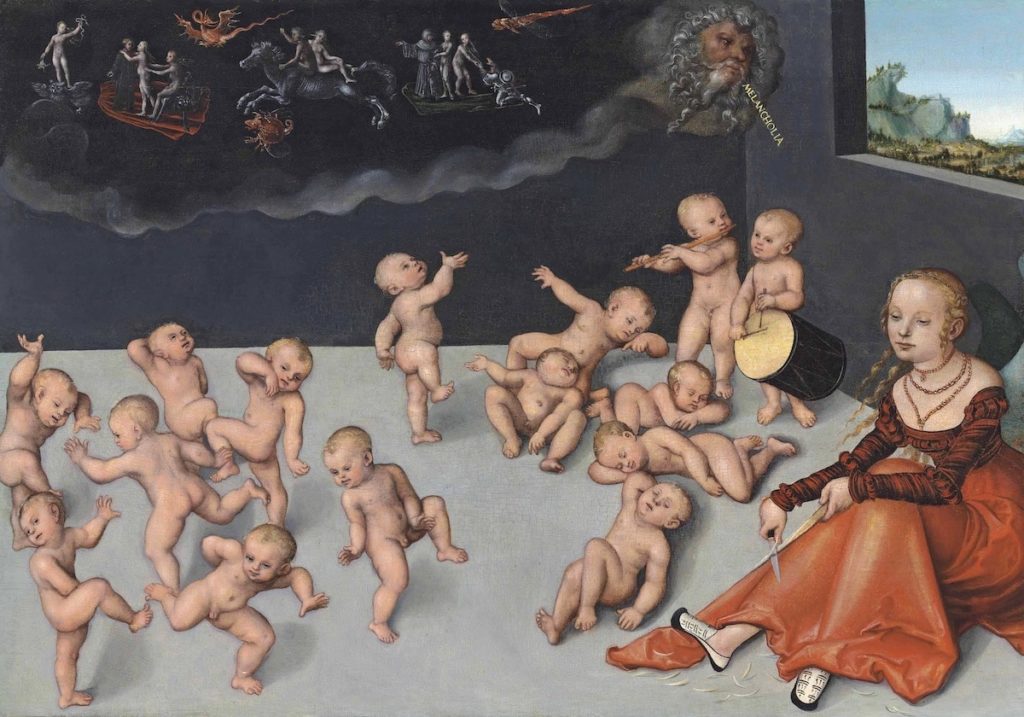Artists have long created works of allegory, that is, artworks that visually symbolize abstract concepts. In AD 1514, Albrecht Dürer made a woodcut of a stewing angelic figure sitting in the midst of a chaotic scene. He called this image “Melancholy.”
Move ahead 14 years, and we find Lucas Cranach making variations on this theme. Cranach was the court painter for Elector Frederick the Wise (who was an ardent supporter of the Lutheran Reformation) and was himself a friend of Martin Luther’s.
Here are several of Cranach’s paintings titled “Melancholy,” followed by some comments. (Click any of the images to link to a higher resolution version).
You’ll note that all of these images differ slightly from Dürer’s. Cranach has made the image more concrete. He retains the angel wings, but he portrays the woman as a mother and not an angel. The woman looks weary and hopeless and dazed (contrast the angel’s anger or frustration), and she idly whittles at a stick. Instead of a single child-like figure, Cranach has multiple children being raucous in various ways. While Dürer has a light shining outside, Cranach pictures demonic forces at work in the world.
Any women who have children will readily identify with Cranach’s paintings of melancholy. Some days it’s hard to get up and do anything—anything at all. The children are making so much noise that there may as well be fifteen of them. The world is generally going to hell. You feel powerless to face all this. Maybe instead of whittling a stick you pull out a cell phone. Whatever the case, the image hasn’t changed much.
Cranach captured well what Luther preached and taught on the topic of melancholy. Luther understood melancholy as a spiritual attack from the devil. Being alone and idle only makes it worse, because then you’re turned in on yourself and lost in your own thoughts. The best thing to do is to be around others, eat and drink, joke and play games and sing.
Here are some things that Martin Luther wrote to a young man who suffered attacks of melancholy:
“You must believe that this temptation of yours is of the devil, who vexes you so because you believe in Christ….You say that the temptation is heavier than you can bear, and that you fear that it will so break and beat you down as to drive you to despair and blasphemy. I know this wile of the devil. If he cannot break a person with his first attack, he tries by persevering to wear him out and weaken him until the person falls and confesses himself beaten. Whenever this temptation comes upon you, avoid entering upon a disputation with the devil and do not allow yourself to dwell on those deadly thoughts, for to do so is nothing short of yielding to the devil and letting him have his way. Try as hard as you can to despise those thoughts which are induced by the devil. In this sort of temptation and struggle, contempt is the best and easiest method of winning over the devil. Laugh your adversary to scorn and ask who it is with whom you are talking. By all means flee solitude, for the devil watches and lies in wait for you most of all when you are alone. This devil is conquered by mocking and despising him, not by resisting and arguing with him….
“Be of good courage, therefore, and cast these dreadful thoughts out of your mind. Whenever the devil pesters you with these thoughts, at once seek out the company of men, drink more, joke and jest, or engage in some other form of merriment….
“When the devil throws our sins up to us and declares that we deserve death and hell, we ought to speak thus: ‘I admit that I deserve death and hell. What of it? Does this mean that I shall be sentenced to eternal damnation? By no means. For I know One who suffered and made satisfaction in my behalf. His name is Jesus Christ, the Son of God. Where he is, there I shall be also.'”*
Cranach’s paintings beautifully reflect Luther’s points about melancholy being from the devil and the dangers of being idle and alone in the midst of it. The paintings also are ridiculously exaggerated in a very helpful way: they capture well the thoughts of melancholy, but seeing those thoughts portrayed in such detail almost makes one laugh and say, “Things aren’t that bad!” If ever you’re suffering from melancholy, seek the company of fellow Christians, seek spiritual care from your pastor, and revisit these paintings so that you can laugh at melancholy.
In Christ,
Pastor Richard
*The quotes are from Luther’s letter to Jerome Weller, dated July 1530. You can find the letter in full in “Luther: Letters of Spiritual Counsel,” translated by Theodore G. Tappert, pages 85-87. Here’s a link to the book.





